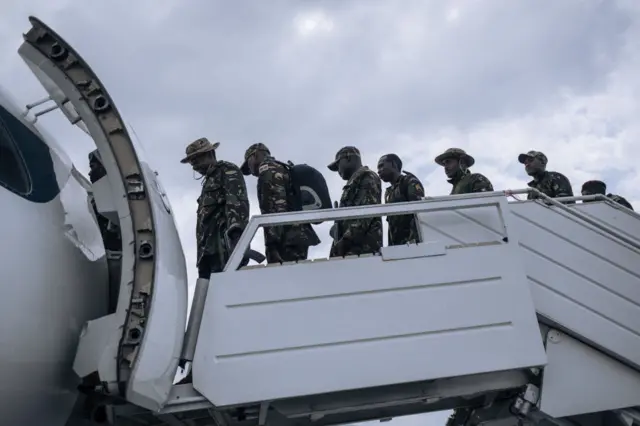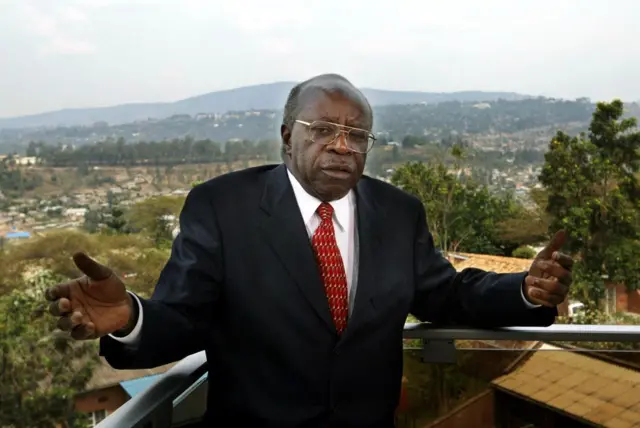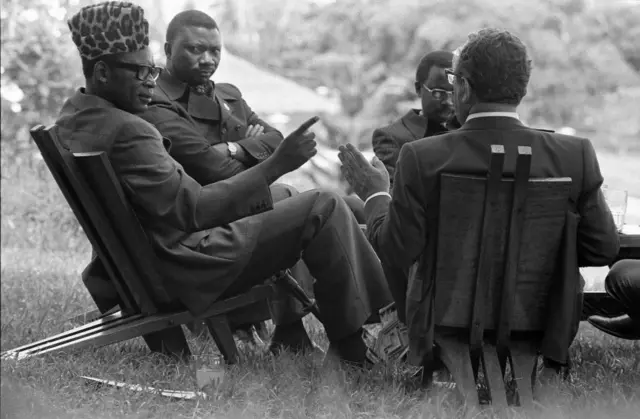Many dozens now dead in wake of Tanzania floodspublished at 17:51 GMT 4 December 2023
A rescue operation is under way after at least 63 die in the northern Hanang district.
Read MoreA rescue operation is under way after at least 63 die in the northern Hanang district.
Read MoreFor the latest updates, go to bbc.com/africalive.
Other rising music stars up for the prize include The Last Dinner Party, Elmiene and Ayra Starr.
Read MoreThe BBC's Fergal Keane returns ahead of elections next year - 30 years since apartheid ended.
Read More Richard Hamilton
Richard Hamilton
BBC World Service newsroom
 Image source, AFP
Image source, AFPAbout 100 Kenyan soldiers left Goma on Sunday
An East African regional force has begun withdrawing from the troubled eastern Democratic Republic of Congo.
The troops were first deployed in the region in November last year at the request of the Congolese government in the hope of containing the resurgent M23 rebel group.
But Kinshasa has since criticised the East African force as ineffective, and has refused to renew its mandate.
Two contingents of about 100 Kenyan soldiers flew out of the airport in Goma, the capital of North Kivu province, early on Sunday.
DR Congo is scheduled to hold a general election on 20 December.
Bernadette Kehoe & Natasha Booty
BBC News
 Image source, AFP
Image source, AFPIt is the latest French media outlet to be banned
The military rulers in Burkina Faso have suspended distribution of the French daily newspaper, Le Monde, over an article on a deadly Islamist attack in the north of the country.
The Communication Minister Rimtalba Jean Emmanuel Ouédraogo described the article about an attack on a military base a week ago as "biased".
The UN says at least 40 civilians were killed, whereas security sources in Burkina Faso spoke of a "few" military deaths.
The Burkinabè authorities have suspended several French media outlets in recent months - including the broadcaster RFI and political magazine Jeune Afrique.
Relations between Burkina Faso and former colonial power France plummeted after the military seized power in a coup last year citing failing efforts to quash a jihadist insurgency that erupted in 2015.
On Saturday, Burkina Faso and Niger said they were pulling out of the French-backed G5 Sahel force.
Related stories:
 Will Ross
Will Ross
Africa editor, BBC World Service
 Image source, AFP
Image source, AFPFaustin Twagiramungu ran for president in 2003
A former prime minister of Rwanda and strong critic of the government of President Paul Kagame has died in exile in Belgium.
Relatives confirmed Faustin Twagiramungu's death on Saturday, saying the 78-year-old had been ill.
Mr Twagiramungu - a moderate Hutu - was prime minister in the government of national unity that was formed after the 1994 genocide.
He fell out with the Tutsi-dominated government when he spoke out against the killings of Hutus.
He resigned from his post in 1995 and went into exile in Belgium.
Mr Twagiramungu returned briefly to Rwanda in 2003 to stand as a presidential candidate but lost to the current leader, Mr Kagame.
You may also be interested in:
Special forces exchanged gunfire with National Guard members after a detained minister was released.
Read MoreBoth nations' military juntas say the G5 serves foreign interests and has not made the region safer.
Read MoreA swell of online interest in the central African nation has young adults questioning what they puff.
Read MoreEthiopian Airlines says the luggage, known by various names across Africa, can damage equipment.
Read MoreAksum's authorities say half a million people are there for the first time since the Tigray war ended.
Read MoreAmid the economic crisis, many survive through cross-border trade, so passports are in high demand.
Read More Aaron Akinyemi
Aaron Akinyemi
BBC World Service
 Image source, Getty Images
Image source, Getty ImagesHenry Kissinger, with his back to the camera on the right, met Zaire's President Mobutu Sese Seko in Kinshasa in 1976. Zaire - now the Democratic Republic of Congo - was a Cold War ally of the US.
Henry Kissinger, the former US Secretary of State known for his pivotal role in foreign policy during the Cold War, died this week aged 100.
Famous for thawing relations between the US and the Soviet Union and China he had a troubled relationship with Africa.
Kissinger’s critics said he ignored the continent for much of his time in the administrations of US presidents Richard Nixon and Gerald Ford. However, in 1976 he made a much-publicised visit to South Africa legitimising it racist apartheid regime and became more involved in African issues.
But he also created a shift in Rhodesia, which was under white-minority rule.
Reflecting some years later on what happened Kissinger said:
Quote MessageIt would not have been predicted... that a Republican administration would take the lead in bringing about the breakthrough to majority rule in Southern Africa. Majority rule had been a liberal cause, never translated into an operational policy."
In 1976, Rhodesia’s white leader, Ian Smith, refused to accept black majority rule in the country which threatened to lead to a pan-regional conflict pulling in apartheid South Africa and newly independent leftist states such as Angola.
Kissinger subsequently played a role in negotiating black-majority rule in Rhodesia and persuading Smith to accede.
However historian Nancy Mitchell said Kissinger spent hours in talks with the white leaders of Rhodesia and South Africa to do this but met with only one black South African community leader critical of apartheid. This sowed deep distrust among black leaders and she said probably “gave apartheid more years”.
She told the Guardian newspaper: “If you study what Kissinger did in Angola and Rhodesia, it really sheds a light on the weakness of his entire policy in Africa…He didn’t study Africa. He went in with a very typical racism of the time, a contempt for all developing countries.”
During the 1970s Kissinger met Mobutu Sese Seko, the president of Zaire (now the Democratic Republic of Congo) a number of times to ensure his firm backing for US interests and policies in Africa.
Mobutu was supported by the Central Intelligence Agency (CIA) and received strong military, diplomatic and financial support from the US in a bid to counteract the influence of communism across Francophone Africa.
A declassified White House document detailing a meeting between Mobutu and Kissinger at the Oval Office in 1973 revealed it was meant to show “the value we place on our close relations with Zaire [and] to reinforce Mobutu’s inclination to support US policy objectives”.
In 1969, Kissinger’s office wrote a memo for Nixon about the Nigerian-Biafran War, one of the bloodiest in post-colonial history.
After secessionists in south-east Nigeria attempted to establish the separate state of Biafra a blockade was imposed by the government of Nigeria preventing civilians from accessing food and medicine. More than a million people are estimated to have died as a result of the conflict.
The memo outlined possible US responses to the crisis - its humanitarian obligations weighed against the political cost of getting involved.
Kissinger said the US should make “every reasonable effort” to provide relief to Biafra but noted that its role alone would not ensure a solution.
He also ruled out the possibility of US military intervention because on the one hand he believed it would bring about a “political disaster” - but on the other hand noted that an intervention was not in the US’s national interest or security.
Read more on Henry Kissinger:
Family members have also complained of "abusive" treatment including arrests and searches.
Read MoreSafina Namukwaya used IVF treatment to conceive and the babies were born prematurely via caesarean.
Read MoreThe carbon credits project will be implemented in six national parks, which span 1.8 million hectares.
Read MoreThe Constitutional Court dismisses complaints about the vote boycotted by much of the opposition.
Read MoreKenyan legend Eliud Kipchoge says Olympic 5,000m champion Joshua Cheptegei can break the marathon world record one day.
Read MoreFour Kenyans have won a legal battle against MSF, Marie Stopes International and a state-run hospital.
Read More